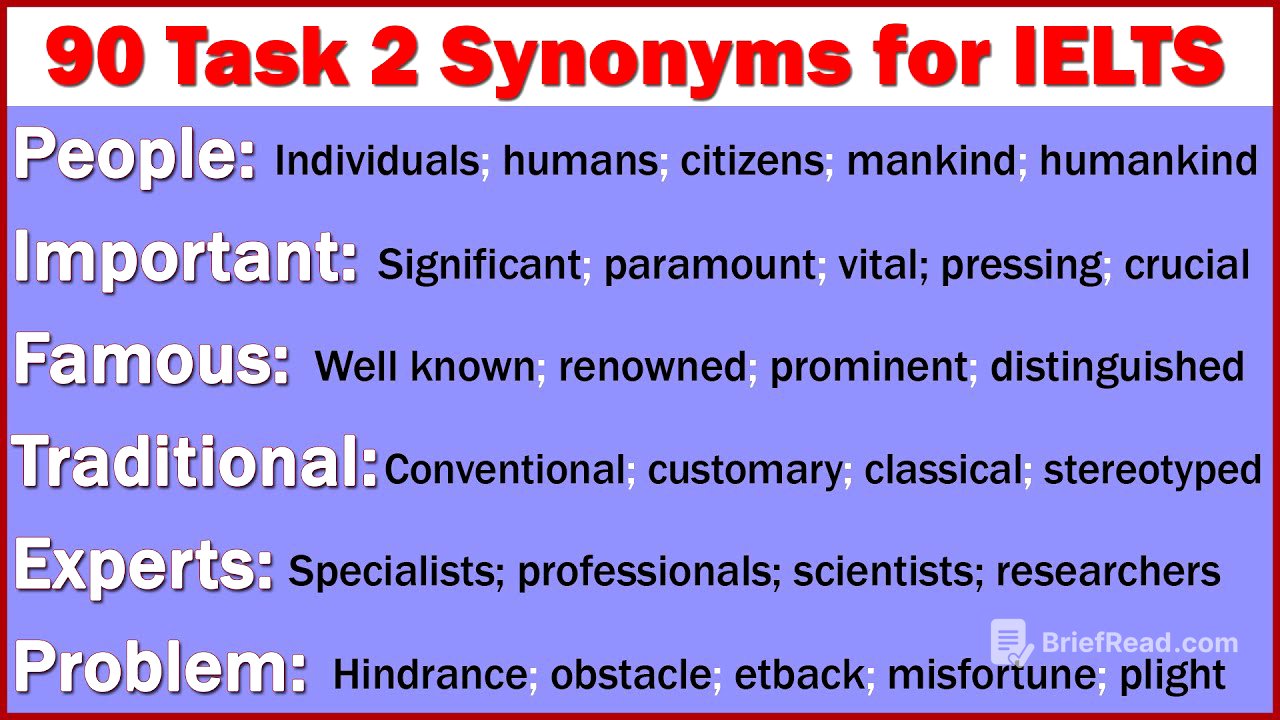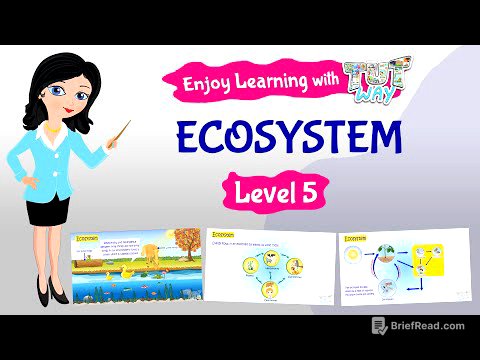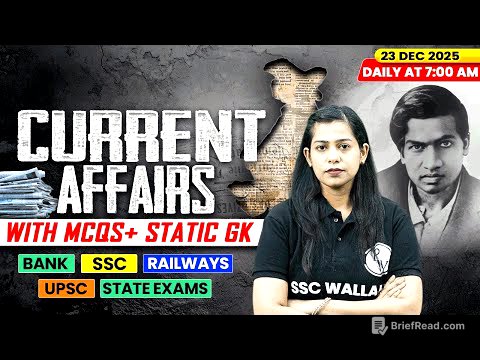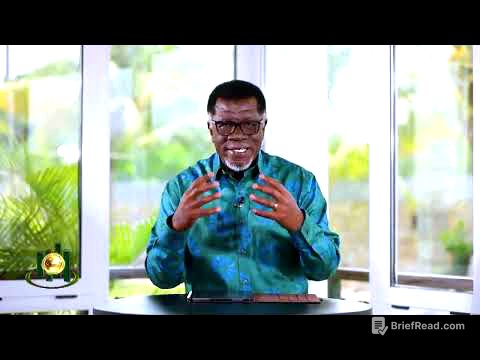TLDR;
This video provides a comprehensive list of synonyms for various English words, enhancing vocabulary and offering alternative ways to express ideas. It covers a wide range of concepts, from simple terms like "people" and "important" to more complex ideas like "environment" and "communication."
- Expands vocabulary with synonyms for everyday words.
- Covers a broad spectrum of concepts and their alternative expressions.
- Useful for improving writing and speaking skills.
People [0:00]
The words "people," "individuals," "humans," and "citizens" are synonyms that refer to a group or collection of persons. "Mankind" and "humankind" are also synonyms that refer to all humans collectively.
Advantage [0:15]
"Advantage," "benefit," "convenience," and "privilege" are synonyms that denote a favorable circumstance or something that provides a positive outcome. "Amenity" refers to a desirable or useful feature or facility of a building or place, while "prerogative" is a right or privilege exclusive to a particular individual or class.
Disadvantage [0:30]
The words "disadvantage," "drawback," and "downside" are synonyms that refer to a negative aspect or unfavorable condition. "Handicap" signifies a circumstance that makes progress or success difficult, while "trouble" and "impediment" denote something that obstructs or hinders progress.
Important [0:48]
"Important," "significant," and "paramount" are synonyms that indicate something of great value or consequence. "Vital," "pressing," and "crucial" also convey the urgency or necessity of something.
Students [1:02]
The terms "students," "learners," and "trainees" are synonyms that refer to individuals who are being taught or are acquiring knowledge. "Pupils," "school boys," and "school girls" specifically refer to students in a school setting.
Teachers [1:18]
"Teachers," "educators," and "instructors" are synonyms describing individuals who impart knowledge or skills to others. "Mentors" provide guidance and support, while "professors" and "academics" are typically associated with higher education institutions.
Famous [1:35]
The words "famous," "well-known," and "renowned" are synonyms that describe someone widely recognized or celebrated. "Eminent," "prominent," and "distinguished" also denote a high level of recognition and respect.
Logical [1:50]
"Logical," "analytical," and "coherent" are synonyms that describe something that is clear, rational, and well-reasoned. "Rational" and "insightful" suggest a deep understanding, while "thorough" implies completeness and attention to detail.
Traditional [2:06]
The terms "traditional," "conventional," and "customary" are synonyms that refer to practices or beliefs that are long-established. "Classical" denotes something of high quality and enduring value, while "stereotyped" refers to a widely held but oversimplified image or idea. "Ritual" describes a set of actions performed according to a traditional or prescribed procedure.
Brief [2:22]
"Brief," "concise," and "succinct" are synonyms that describe something that is short and to the point. "Compressed" and "compact" also convey the idea of being condensed or shortened, while "summary" refers to a brief overview of the main points.
Begin [2:37]
The words "begin," "initiate," and "commence" are synonyms that mean to start or set in motion. "Inaugurate" implies a formal beginning, while "undertake" means to commit to and begin a task. "Instigate" means to provoke or start something, often with negative connotations.
Solution [2:52]
"Solution," "formula," and "remedy" are synonyms that refer to a way to solve a problem or correct a situation. "Resolution" implies a firm decision to do or not do something, while "panacea" is a solution or remedy for all ills or difficulties. "Way out" simply means a means of escape or resolution.
Show [3:08]
The terms "show," "exhibition," and "demonstration" are synonyms that refer to a public display or presentation. "Display" and "presentation" are general terms for showing something, while "showcase" highlights the best features of something.
Strong [3:23]
"Strong," "formidable," and "robust" are synonyms that describe something or someone powerful and resilient. "Durable," "tough," and "substantial" also convey the idea of being able to withstand wear and tear or pressure.
Views [3:39]
The words "views," "opinions," and "notions" are synonyms that refer to personal beliefs or judgments. "Beliefs," "ideas," and "concepts" also denote thoughts or understandings about something.
Agree [3:55]
"Agree," "assent," and "consent" are synonyms that mean to express approval or willingness. "In favor" indicates support for something, while "comply" means to act in accordance with a rule or request. "Approve of" means to have a positive opinion of something.
Migrating [4:09]
The terms "migrating," "shifting," and "moving" are synonyms that refer to changing location or position. "Relocating" and "departing" specifically imply leaving one place to settle in another.
Old-fashioned [4:25]
"Old-fashioned," "outdated," and "obsolete" are synonyms that describe something no longer in general use or relevant. "Outmoded," "antiquated," and "ancient" also convey the idea of being very old or no longer current.
Dangerous [4:41]
The words "dangerous," "hazardous," and "perilous" are synonyms that indicate a risk of harm or injury. "Risky," "threatening," and "insecure" also convey the potential for negative consequences.
Information [4:56]
"Information," "data," and "figures" are synonyms that refer to facts or details about something. "Details," "facts," and "statistics" also denote specific pieces of knowledge or numerical data.
Youth [5:12]
The terms "youth," "adolescence," and "young people" are synonyms that refer to the period of life between childhood and adulthood. "Teens," "childhood," and "juveniles" also denote young individuals or the period of being young.
Half [5:28]
The video transitions to discussing synonyms for the word "possess".
Possess [5:32]
"Possess," "occupy," and "own" are synonyms that mean to have something as one's property. "Hold" and "retain" also convey the idea of keeping or maintaining possession of something.
Acceptable [5:42]
The words "acceptable," "reasonable," and "appropriate" are synonyms that mean suitable or fitting for a particular purpose or situation. "Fair," "satisfactory," and "adequate" also convey the idea of meeting a certain standard or requirement.
Problem [5:58]
"Problem," "hindrance," and "obstacle" are synonyms that refer to something that causes difficulty or prevents progress. "Setback," "misfortune," and "plight" also denote negative situations or difficulties.
Many [6:13]
The terms "many," "countless," and "numerous" are synonyms that mean a large number. "Myriad," "considerable," and "manifold" also convey the idea of a great quantity or variety.
Awful [6:28]
"Awful," "dreadful," and "offensive" are synonyms that describe something extremely unpleasant or shocking. "Horrible," "appalling," and "nasty" also convey a strong sense of dislike or disgust.
Gather [6:43]
The words "gather," "accumulate," and "collect" are synonyms that mean to bring together or amass. "Assemble," "aggregate," and "horde" also convey the idea of bringing things together into a group or mass.
Good [6:58]
"Good," "excellent," and "stunning" are synonyms that describe something of high quality or pleasing. "Outstanding," "exceptional," and "great" also convey a sense of superiority or impressiveness.
Life [7:12]
The video transitions to synonyms for the word "live".
Dwell [7:16]
"Dwell," "reside," and "settle" are synonyms that mean to live in a particular place. "Inhabit" means to live in or occupy a place, while "survive" means to continue to live or exist.
Century [7:27]
The terms "century," "generation," and "millennium" are synonyms that refer to periods of time. "Epoch" and "era" also denote significant periods in history.
Easy [7:43]
"Easy," "effortless," and "straightforward" are synonyms that describe something that requires little effort or is simple to do. "Simple" and "painless" also convey the idea of being uncomplicated or without difficulty.
Outgoing [7:53]
The video transitions to synonyms for the word "die".
Die [7:57]
"Die," "demise," and "pass away" are synonyms that mean to stop living. "Terminate," "perish," and "succumb" also convey the idea of coming to an end or giving way to something.
Children [8:12]
The words "children," "infants," and "newborns" are synonyms that refer to young human beings. "Youngsters," "juveniles," and "babies" also denote young individuals.
Weak [8:29]
"Weak," "feeble," and "vulnerable" are synonyms that describe something or someone lacking strength or resilience. "Fragile," "delicate," and "frail" also convey the idea of being easily damaged or broken.
Continue [8:43]
The terms "continue," "maintain," and "sustain" are synonyms that mean to keep something going or in existence. "Carry on," "uphold," and "keep going" also convey the idea of persisting or persevering.
Experts [8:58]
"Experts," "specialists," and "professionals" are synonyms that describe individuals with extensive knowledge or skill in a particular area. "Scientists" and "researchers" are experts who conduct systematic investigations to discover and interpret facts.
Parents [9:14]
The words "parents," "guardians," and "forebears" are synonyms that refer to individuals who raise and care for children. "Progenitors," "caretakers," and "begetters" also denote those who bring forth and nurture offspring.
Reduce [9:30]
"Reduce," "lessen," and "diminish" are synonyms that mean to make something smaller or less. "Deplete," "shrink," and "lighten" also convey the idea of decreasing in size, amount, or intensity.
Control [9:45]
The terms "control," "manage," and "supervise" are synonyms that mean to have authority over or direct something. "Regulate," "curb," and "manipulate" also convey the idea of influencing or directing something, sometimes in a subtle or indirect way.
Country [10:02]
"Country," "nation," and "state" are synonyms that refer to a political entity with a defined territory and government. "Province," "kingdom," and "territory" also denote geographical or political divisions.
Increase [10:16]
The words "increase," "growth," and "expansion" are synonyms that mean to become larger or more extensive. "Increment," "surge," and "escalation" also convey the idea of a rise or increase in something.
Effect [10:32]
"Effect," "result," and "outcome" are synonyms that refer to what happens as a consequence of something. "End product," "aftermath," and "impact" also denote the consequences or effects of an action or event.
Describe [10:47]
The terms "describe," "express," and "explain" are synonyms that mean to give an account of something. "Illustrate," "elucidate," and "narrate" also convey the idea of making something clear or telling a story.
Lack [11:03]
"Lack," "deficiency," and "shortage" are synonyms that mean a state of not having enough of something. "Deficit," "dearth," and "scarcity" also convey the idea of an insufficient amount or supply.
Environment [11:17]
The words "environment," "natural world," and "Mother Nature" are synonyms that refer to the natural surroundings. "Ecology," "surroundings," and "conditions" also denote the external factors that affect living organisms.
Big [11:36]
"Big," "enormous," and "gigantic" are synonyms that describe something of great size. "Massive," "immense," and "substantial" also convey the idea of being large or significant.
Legal [11:50]
The terms "legal," "legitimate," and "lawful" are synonyms that mean conforming to the law. "Rightful," "authorized," and "valid" also convey the idea of being in accordance with rules or principles.
Essential [12:05]
"Essential," "crucial," and "requisite" are synonyms that mean absolutely necessary. "Indispensable," "necessary," and "compulsory" also convey the idea of being required or obligatory.
Fast [12:22]
The words "fast," "accelerated," and "rapid" are synonyms that describe something moving or happening quickly. "Brisk," "nimble," and "ultra-fast" also convey the idea of speed or quickness.
Funny [12:38]
"Funny," "comical," and "witty" are synonyms that describe something amusing or humorous. "Hilarious," "amusing," and "humorous" also convey the idea of causing laughter or enjoyment.
Amazing [12:52]
The terms "amazing," "fabulous," and "awesome" are synonyms that describe something causing great surprise or wonder. "Incredible," "mind-blowing," and "astounding" also convey the idea of being extraordinary or astonishing.
Find [13:09]
"Find," "detect," and "obtain" are synonyms that mean to discover or locate something. "Pinpoint," "discover," and "unearth" also convey the idea of finding something specific or hidden.
Make [13:24]
The words "make," "assemble," and "build" are synonyms that mean to create or construct something. "Device," "construct," and "form" also convey the idea of creating something from different parts or materials.
Very [13:38]
"Very," "extremely," and "particularly" are synonyms that intensify the degree of something. "Genuinely," "incredibly," and "really" also convey a high degree or intensity.
Usually [13:54]
The terms "usually," "basically," and "generally" are synonyms that mean in most cases or under normal circumstances. "Casually," "normally," and "commonly" also convey the idea of being typical or ordinary.
Profession [14:08]
"Profession," "occupation," and "employment" are synonyms that refer to a job or career. "Job," "walk of life," and "career" also denote the work that someone does to earn a living.
Tourists [14:24]
The words "tourists," "travelers," and "visitors" are synonyms that refer to people who are visiting a place for pleasure. "Holiday makers," "sightseers," and "trippers" also denote individuals who are traveling for leisure or recreation.
World [14:41]
"World," "globe," and "Earth" are synonyms that refer to the planet on which we live. "Planet," "universe," and "sphere" also denote celestial bodies or the entirety of space.
Old People [14:55]
The terms "old people," "elderly," and "senior" are synonyms that refer to individuals who are advanced in age. "Aging," "aged," and "retired" also denote the state of being old or having stopped working.
Government [15:10]
"Government," "administration," and "authority" are synonyms that refer to the system or group of people governing a country or state. "Officials," "executive," and "state" also denote those in positions of power or the governing body itself.
Develop [15:27]
The words "develop," "upgrade," and "prosper" are synonyms that mean to grow or improve. "Advance," "elevate," and "improve" also convey the idea of making progress or enhancing something.
Encourage [15:41]
"Encourage," "motivate," and "inspire" are synonyms that mean to give someone confidence or enthusiasm to do something. "Empower," "advocate," and "support" also convey the idea of giving someone the means or backing to achieve something.
Negative [15:56]
The terms "negative," "adverse," and "harmful" are synonyms that describe something unfavorable or damaging. "Damaging," "hurtful," and "destructive" also convey the idea of causing harm or destruction.
Expensive [16:13]
"Expensive," "costly," and "extravagant" are synonyms that describe something high in price. "High-priced," "exorbitant," and "overpriced" also convey the idea of being excessively expensive.
Modern [16:29]
The words "modern," "contemporary," and "present-day" are synonyms that refer to something belonging to the current time. "Trendy," "cutting-edge," and "updated" also convey the idea of being fashionable or up-to-date.
Communication [16:45]
"Communication," "socialization," and "interaction" are synonyms that refer to the exchange of information or ideas. "Conversation," "dealings," and "contact" also denote ways in which people communicate or interact.
Difference [17:03]
The terms "difference," "dissimilarity," and "contrast" are synonyms that refer to the state of being unlike or distinct. "Disparity," "variation," and "diversity" also convey the idea of differences or variety.
Band [17:19]
The video transitions to synonyms for the word "forbid".
Forbidden [17:22]
"Forbidden," "restricted," and "contraband" are synonyms that mean not allowed or prohibited. "Outlawed" and "unlawful" also convey the idea of being against the law.
Pollution [17:34]
The words "pollution," "contamination," and "impairment" are synonyms that refer to the presence of harmful substances in the environment. "Dirtiness," "tainting," and "infection" also denote the state of being impure or harmful.
Reducing [17:51]
"Reducing," "mitigating," and "dwindling" are synonyms that mean making something smaller or less. "Curbing," "downsizing," and "lessening" also convey the idea of decreasing or diminishing.
Consume [18:06]
The terms "consume," "deplete," and "exhaust" are synonyms that mean to use up or diminish something. "Diminish," and "squander" also convey the idea of using something wastefully or excessively.
Train [18:17]
The video transitions to synonyms for the word "disagree".
Disagree [18:21]
"Disagree," "oppose," and "challenge" are synonyms that mean to have a different opinion or to object to something. "Refute," "argue," and "contradict" also convey the idea of expressing disagreement or proving something wrong.
Prison [18:37]
The words "prison," "lockup," and "imprisonment" are synonyms that refer to a place where people are confined as punishment for a crime. "Captivity," "custody," and "detention" also denote the state of being held against one's will.
Weaknesses [18:51]
"Weaknesses," "shortcomings," and "deficiencies" are synonyms that refer to flaws or inadequacies. "Limitation," "inadequacy," and "flaws" also convey the idea of lacking something or having imperfections.
Games [19:07]
The terms "games," "contest," and "tournament" are synonyms that refer to competitive activities. "Sports," "competition," and "championship" also denote organized events in which individuals or teams compete.
Bad Effects [19:24]
"Bad effects," "harmful impact," and "negative effects" are synonyms that refer to the undesirable consequences of something. "Detriments" and "repercussions" also convey the idea of adverse outcomes or results.
Program [19:39]
The words "program," "course," and "workshop" are synonyms that refer to a planned series of events or activities. "Seminar," "agenda," and "affairs" also denote organized events or matters under consideration.
Strict [19:53]
"Strict," "harsh," and "rigorous" are synonyms that describe something severe or demanding. "Stringent," "unyielding," and "firm" also convey the idea of being inflexible or uncompromising.
Effective [20:09]
The terms "effective," "constructive," and "productive" are synonyms that describe something achieving the desired result. "Functional," "capable," and "practical" also convey the idea of being useful or efficient.
Happy [20:25]
"Happy," "cheerful," and "delighted" are synonyms that describe a feeling of pleasure or joy. "Jubilant," "delightful," and "heartwarming" also convey the idea of being filled with happiness or joy.
Calm [20:39]
The words "calm," "peace," and "tranquil" are synonyms that describe a state of serenity or quietude. "Serene," "placid," and "harmonious" also convey the idea of being undisturbed or peaceful.
Dull [20:55]
"Dull," "monotonous," and "uninteresting" are synonyms that describe something lacking excitement or interest. "Tedious," "boring," and "mundane" also convey the idea of being repetitive or commonplace.
Funny [21:09]
The video revisits synonyms for "funny," providing additional options.
Funny [21:09]
"Funny," "humorous," and "hilarious" are synonyms that describe something causing amusement or laughter. "Comical," "laughable," and "witty" also convey the idea of being amusing or clever.
New [21:24]
The terms "new," "unique," and "latest" are synonyms that describe something recently made or different from others. "Current," "original," and "innovative" also convey the idea of being up-to-date or inventive.
Wrong [21:39]
The words "wrong," "incorrect," and "mistaken" are synonyms that mean not correct or accurate. "Erroneous," "unsound," and "inaccurate" also convey the idea of being flawed or untrue.
Conflict [21:55]
"Conflict," "battle," and "hostility" are synonyms that refer to a state of opposition or struggle. "Struggle," "collision," and "assault" also denote clashes or confrontations.









